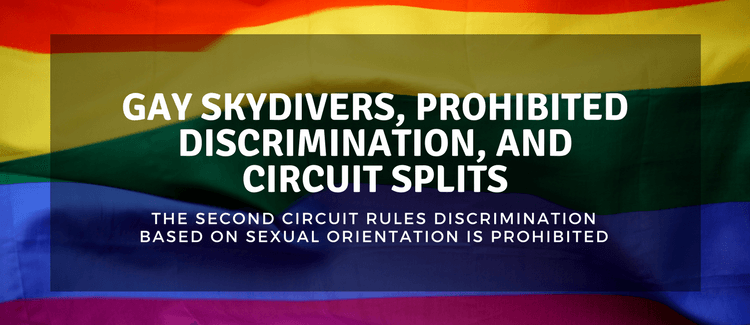Gay Skydivers, Prohibited Discrimination, and Circuit Splits
The Second Circuit Rules Discrimination Based on Sexual Orientation Is Prohibited
Last Monday, February 26, 2018, the Second Circuit became the latest federal appeals court to join the Equal Employment Opportunity Commission’s (EEOC’s) position that discrimination based on sexual orientation is a prohibited Title VII sex discrimination, overruling prior Second Circuit precedent. Here’s what you need to know:

What Types of Discrimination are Prohibited Under Title VII?
Title VII of the Civil Rights Act of 1964 is a federal law that prohibits employers from discriminating against employees based on sex, race, color, national origin, and religion. Given Title VII’s vagueness, courts have reviewed countless cases with hopes of finding out exactly what these protected traits include. Sex discrimination is particularly difficult to define because of the broad interpretation of the word “sex.” Advocates for inclusion of sexual orientation as a protected class make the argument that “because of” an individual’s sex, they are discriminated against as a homosexual. For example, if a lesbian woman is treated poorly in the workplace because she is attracted to other women but would not have been treated poorly if she were a man attracted to other women, then there seems to be sex discrimination based on her sexual orientation. However, opponents might argue that if the drafters intended to make sexual orientation a protected class, then they would have listed it in Title VII. Courts across the country have dealt with this issue many times in the past, but the rulings have generally not been so favorable for plaintiffs.
Case Background and Ruling
The case brought to the Second Circuit in September of 2017, Zarda v. Altitude Express, involved gay skydiver Donald Zarda, who alleged Title VII sex discrimination, stating that he was fired because he was gay and failed to conform to male stereotypes. Zarda passed away after bringing the claim against his employer, but his estate continued with the claim. Before the federal appeal, the District Court for the Eastern District of New York dismissed Zarda’s discrimination claim, citing and reinforcing precedent that sexual-orientation based discrimination claims are not within the scope of Title VII.
The Second Circuit reversed the decision of the district court and determined that “sexual orientation discrimination is motivated, at least in part, by sex and is thus a subset of sex discrimination.” The court notes that legal doctrine evolves over time and goes on to explain that sexual orientation should be treated as a subset of Title VII sex discrimination because 1) “one cannot fully define a person’s sexual orientation without identifying his or her sex,” 2) “sexual orientation discrimination is predicated on assumptions about how persons of a certain sex can or should be, which is an impermissible basis for adverse employment actions,” and 3) sexual orientation discrimination is associational discrimination based on gender.” In conclusion, the court explained “when, for example, an employer acts on the basis of a belief that men cannot be attracted to men, or that they must not be, but takes no such action against women who are attracted to men, the employer has acted on the basis of [sex].”
What Does the Second Circuit Ruling Mean for Employers/Employees in Arizona?
The Zarda decision only currently applies to Connecticut, Vermont, and New York and doesn’t really have any immediate effect on Arizona residents. However, it suggests that there could be changes in the law on the horizon. Title VII does not currently offer protection based on sexual orientation, but Phoenix, Tucson, Tempe, and Flagstaff have enacted laws prohibiting public and private sector employment discrimination based on sexual orientation and gender identity. Additionally, 78% of Arizona residents polled believe that discrimination based on sexual orientation should be prohibited in the workplace. The best employment practice is to treat all employees equally under Title VII, have defined harassment policies, and base employment decisions on the individual employee’s performance. Based on the sexual orientation discrimination’s state and national attention, it is safe to say that the issue is here to stay, especially if the Supreme Court decides to review the case due to the circuit split in the federal appellate courts.
What is a Circuit Split?
Where the Zarda really gets hot is in the circuit split. When it sided against the majority, it drew more attention to itself within the federal courts of appeals. A circuit split occurs in the U.S. federal courts when two or more circuit courts of appeals provide conflicting rulings on identical legal issues. The Supreme Court often uses circuit splits within the federal courts to choose which cases to review at the highest level. Last year, the Seventh Circuit started creating the split in the circuit courts when it ruled that discrimination based on sexual orientation was prohibited under Title VII. Despite the rift, the Supreme Court denied certiorari, thus foregoing taking up the issue of sexual orientation as prohibited discrimination in the workplace. Now that the Second Circuit has joined the Seventh, the chances of being granted certiorari by the Supreme Court are far more likely.
If Picked Up by the Supreme Court Rule, How Will They Rule on This Issue?
For now, legal scholars can only speculate on how the Supreme Court will rule on the issue if the case is granted cert. Even if the Supreme Court does not choose to hear the Zarda case now, it will likely review a similar case in the future because the discrimination based on sexual orientation cases will not disappear any time soon. With the EEOC’s current emphasis on sexual orientation and the national attention surrounding the movements of the LGBTQ community, there will be even more appellate rulings in the future, meaning more opportunities for review.
As an employer in Arizona, treat all of your employees equally by basing hiring, promotions, and treatment on performance, rather than unrelated traits or characteristics. If you feel like you have been on either side of a wrongful termination or employment discrimination, as the employee or employer, talk to an experienced employment attorney today.
Approved By:

1930 N Arboleda #200
Mesa, AZ 85213
Office: 480-325-9900
Email: [email protected]
Website: dentonpeterson.com